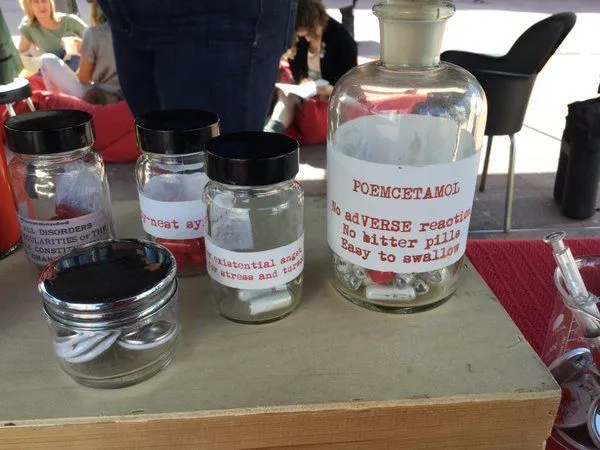Writer's Weekend

For many, The Auckland Writers Festival is an annual pilgrimage. We come to listen, catch up with friends, buy books we don’t mean to but can't resist, and listen to favourite authors in puppy-eyed wonder. We strategise, weigh up sessions, and queue in what must be some of the most polite queues in the world. We time when to buy coffee and go for a wee, and we force ourselves to take regular breaks so our brains don’t explode.
I’ve volunteered, MCed and even (once) been an invited writer at The Auckland Writers Festival, so I consider myself well equipped to deal with the rigors of a weekend at the Festival. But the morning after, as newly announced attendance figures show the Festival has once again broken records, I am still feeling a bit steamrollered. In a good way.
Saturday
I kicked off early on Saturday morning with The Art of the Short Story. Despite the 9am start, there were only a few seats left as I raced in, 3 minutes late. Damien Wilkins and Elizabeth McCracken were being grilled by Sue Orr with some well-prepared questions: “How do you teach the rules of the short story? Are there rules?”
Wilkins: “But no-one knows what a story is, a poem is, a novel is. Everything is created from nothing.” The feisty McCracken, clearly a morning person, told a story about a basketball coach watching his protégé: “He was going, ‘no, don’t stand there! not like that! – oh, good shot.’” Her point being, breaking the rules is OK- if you win. Whereas following the rules may not guarantee success. “But the essential thing is to experience enough first…read a ton of stories to see how they work.” They encouraged us to think of the short story as words encompassing a void. The gap – what you leave unsaid – becomes a ‘pulsing presence’, pushing the reader on: “the writer’s job is to put meaning into the short story,” Wilkins explained. “The reader’s job is to find it – what does it mean? What does the moment after the story do?” I floated out, inspired to create a lingering afterlife for my stories.
It was time for a mocha, and a free copy of the NZ Herald. Lugging both I headed into the next session, A History in Seven Killings, with 2015 Booker Prize winner Marlon James being interviewed by Noelle McCarthy. James cut a casual figure, chatting about sex scenes and what he has requested his mother not read, but it's clear he is a fiercely intellectual writer who has a lot to say on politics and history: “History changes depending on who’s telling it. The past is always changing.” He then explained how he births a novel: “Each one needs a different process. It’s painful – you think, how the hell did I end up here again? But you need to discover the ‘eureka’ moment that makes the whole thing work.” He acknowledged that finding his characters is sometimes hard: “I like being in those scenes. I like being in discomfort, trying to write my way out of those scenes.” One of his favourite quotes is from Phil Roth. “’Write like your parents are dead.’ Writers need to get over their personal taboos and let their characters be themselves. There’s a point where my characters become people. They start to surprise and they start to disappoint. This is my first novel where I embraced that.”
Out in the bright sunshine of Aotea Square, I squinted at what appeared to be a mirage of a vintage ambulance. It was real. It said The Emergency Poet. Inside the ambulance, an ailing audience member was being tended to by a white coated doctor. I took a look at some poetry books and took a couple of poetry pills while I waited for my turn. Some people were lounging on red bean bags in the ‘waiting area’ while nurses rushed about, administering a few words here and there. The seagulls circled, waiting for scraps.
Deborah Alma is charming, English, and mad about poetry. She asked me to lie down on the stretcher (the ambulance was on loan from St John Ambulance – in England Alma travels in her own 1970s ambulance.) Then, clipboard in hand, she took my poetic history: Have you been to the sea or a wild place recently? Describe your room when you are old. If you had a generous voucher and the run of a bookstore, where would you look first? After careful consideration she reached into her filing concertina and presented me with two poetry prescriptions: ‘The Word’, by Tony Hoagland, and ‘Arrival’, by R S Thomas. She wrote at the bottom, “Take poems as often as necessary. With a glass of water, sitting in a light place.” So I did. The river dawdles/to hold a mirror for you/where you may see yourself/as you are, a traveller/with the moon’s halo above him….
This proved to be the perfect preparation for Sir David Hare’s session. In conversation with Simon Wilson, he mused on a life of finding and telling stories: “Bewilderment has been the great driving force of my life.” It seemed to be unnecessary humility coming from a playwright and screenwriter known for incisive breakdowns of political regimes. For Hare, there is a deeper purpose: “Any decent political play isn’t just about itself. There is a metaphor. It has to be bigger than the thing it’s about.” But, joking that “management has a knack for seating you next to the people enjoying your play least”, he wondered if this was in fact a good thing: “All playwrights are thin skinned. It’s in the nature of the job.” A few minutes later no one in the room was feeling sorry for him as he admitted there were certain perks to writing for a National Theatre. For example, the ability to have epic, large cast plays produced: “I want to feel history blowing through the room.”
We emerged from the ASB Theatre to long queues impatient to get in for Gloria Steinem’s sold out session. I chose to go to the last ever Poetry Idol instead. After a glorious decade, Idol is bowing out – but there’s no need to be bereft, there are now many Poetry Slams around the city and indeed country, part of the renaissance currently sweeping poetry off its feet. But Poetry Idol was one of the first big ones. Creator and MC Penny Ashton was emotional as she welcomed the capacity crowd, stating that 99 poets – yours truly among them – had competed for the title. (I was knocked out in the first round and it was nine years ago, but a fellow audience member still recognised me: “You’re that girl with the banana!” So chuffed.)
For those unfamiliar with the concept of a slam, this is competitive poetry: ten poets going head to head with their best poems, judges rating them in public on their writing and performance, with the audience voting on the winner after two rounds. Brutal, but also oddly nurturing. The format breeds diehard fans, with people bringing groups year after year: Ashton asked how many people had been to all ten, and there was a small core of cheering.
But enough of the stats. The poets were amazing. I know I’m biased, but they were. And one of the cool things about NZ slams is how none of the poets sounds like each other: they all have a difference in style, material ranging from an evocation of Kaupapa Māori, to an analysis of the psyche of Disney Princes to a spine tingling coming-out on stage of a young transgender man. After judges Zane Scarborough, Jan-Maree Franicevic and Carrie Rudzinski had done their duty, the audience was left genuinely torn between two finalists, Liam Jacobson and Jesse Fenton. An 18 year old with astonishing perspective on his generation versus a young lawyer with immaculate performance and writing. I won’t tell you who I voted for but Jesse was the eventual winner. I was so high on poetry I didn’t want to go home so I stuck around for a while to inhale the fumes with the judges. The moon smiled down at me, its halo still gently glowing.
See part two for Sunday’s AWF adventures.
